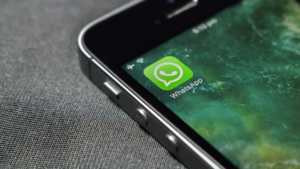 By Vivian Jones*
By Vivian Jones*
WhatsApp has over 2 billion users in over 180 countries, making it the most popular messaging app in Latin America. 961,300 Brazilians use WhatsApp (according to a Statista survey). This means that, regardless of your target audience, WhatsApp is almost certainly one of their favorite communication channels, and it may already be one of the best channels for establishing a commercial dialogue with this audience.
For a culture in which the customer must be at the center of any and all communication, marketing, advertising or publicity actions, starting the dialogue through the customer's favorite channel, or simply having it as an option for a transfer, is already a step in the right direction to engage much more.
That said, it is important to remember that engagement goes beyond “communicating.” It represents a much closer relationship between the consumer and the brand, and it does not come without efforts related to personalization. Twilio’s 2024 Customer Engagement Report found that 82% of interactions between customers and brands are digital and that 36% of people spend more with companies that personalize their communications. Through personalization, engagement is achieved, which ultimately generates financial returns.
With this line of thought in mind, it’s time to think about how to achieve financial returns, in this case using WhatsApp as a tool for personalized and engaging dialogue. Twilio recently released an e-book entitled “The Power of WhatsApp to Engage Customers: A Practical Guide”. It presents a lot of relevant information on this subject, as well as providing powerful insights into the topic.
Based on this, I want to provide a general overview of what is discussed in the material, in order to make you curious to check out the material in full and start embracing WhatsApp in your journey to improve the relationship between you and your customers. So, let's reflect on the direction of WhatsApp in the customer journey and six hot tips on how to get started on the customer engagement journey with WhatsApp.
What functions should WhatsApp target?
WhatsApp can be a tool used to send promotional messages, such as loyalty programs, engagement campaigns, customer acquisition, lead qualification, after-sales and loyalty, self-service via chatbot, among other possibilities.
Meta recently launched, and Twilio is now with customers in beta testing for the new WhatsApp Business Calling functionality, where the user can make a voice call to the company using the WhatsApp application with Twilio Programmable Voice. With WhatsApp Business Calling, customers and brands will have the voice channel to communicate, for various use cases, such as service, customer support, sales, after-sales, among others.
 This powerful application, when combined with customer engagement platforms, becomes a channel for automated campaigns, while still being personalized. It is even possible to use predictive AI to collect, integrate and deeply analyze customer data, which will be used in dialogues via the app.
This powerful application, when combined with customer engagement platforms, becomes a channel for automated campaigns, while still being personalized. It is even possible to use predictive AI to collect, integrate and deeply analyze customer data, which will be used in dialogues via the app.
Despite this, it is important to remember that for more robust personalization, it is important to collect quality data, first-party data or primary customer data, and an open dialogue channel, such as WhatsApp, is ideal for this.
Using WhatsApp in marketing and sales
- Know your audience in detail – it all starts with understanding who your audience is. There is no strategy without prior knowledge of preferences, needs, pains, desires, language, service channels, most loved products/services, etc.;
- Segmentation – personalization is closely linked to segmentation, which defines common characteristics and behaviors among customers. Here, it is possible to use AI to analyze large volumes of data and monitor changes;
- Plan – the customer journey needs to be thought out step by step. It’s not enough to just start a conversation; there needs to be a marketing flow that leads to sales within the communication designed for WhatsApp;
- Be creative – it is important to explore the different message formats, sending conversational messages with texts, images, videos and website links, blog posts or even news related to the segment. To make this more automated, it is possible to implement an intelligent chatbot to serve the public through selected buttons or according to keywords;
- Mental triggers – Since messages are instantaneous, there is little time to capture someone’s attention. Mental triggers are techniques that encourage people to take a certain action. There are several types of triggers, such as urgency, social proof and authority;
- Click-to-Ads for WhatsApp – the idea is to have a link that takes the customer directly to the brand’s WhatsApp, allowing them to start a conversation without having to have the number saved in their address book. It is important to monitor the click rate, the number of people who actually start a conversation and the average response time of the agents.
Additionally, as a bonus tip, when you use the WhatsApp Business API integrated with Twilio's customer engagement platforms, you gain in scalability and customization of campaigns and messages; great delivery capacity; integration of chatbots and intelligent virtual assistants into the application; multichannel support in a single API; collection of third-party data more securely and in accordance with legislation; sending data to more than 400 applications with predefined integrations; and automation of processes and sending of campaigns, content and notifications.
With these tips, I hope I have intrigued you to learn a little more about how to start using this communication channel as a powerful tool to personalize, engage and obtain a better return, both financially and in terms of relationships with your customers. If you want to know more, the complete e-book on the subject is available at: The Power of WhatsApp to Engage Customers: A Practical Guide.
*Vivian Jones is vice president of Twilio for Latin America.
About Twilio
Today's leading companies rely on Twilio's Customer Engagement Platform (CEP) to build direct, personalized relationships with their customers around the world. Twilio's core communication APIs allow businesses to engage with their customers through voice, conversations, messaging, video and email. Twilio Segment, the leading customer data platform, enables companies to create highly personalized interactions and automated customer profiles based on first-party data from multiple channels. Twilio enables companies to use communications and data to add intelligence to every step of the customer journey, from sales to marketing, growth, customer service and many other engagement use cases, in a flexible and programmatic way. In 180 countries, millions of developers and hundreds of thousands of businesses use Twilio to create magical experiences for their customers.
To learn more, visit https://www.twilio.com/pt-br/
Social media:
https://www.linkedin.com/company/twilio-inc-/
https://www.instagram.com/twilio
https://www.facebook.com/TeamTwilio
Notice: The opinion presented in this article is the responsibility of its author and not of ABES - Brazilian Association of Software Companies













